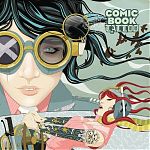- Articles
- Cherries
- Minutiae
- Q&A
- RAINN
- Releases
- Reviews
- Site News
- Them
- Toriphiles
- Touring
- TV/Radio/Web
- Video
News Archives
Keep an eye on our Twitter and Facebook pages since we often post quickie updates there when we're on-the-go.
During tours, we do our best to cover setlists in real-time on Twitter. If you want to tweet a show in, just DM or @ us on the day and tell us to watch your stream that night.
Tori is touring in 2017 to support the release of Native Invader. The European legs runs from early September through early October and the North American leg runs from late October to early December. We do not know if additional dates elsewhere will be added.

Native Invader (album, 2017)

Unrepentant Geraldines (album, 2014)

Gold Dust (album, 2012)

Night of Hunters (album, 2011)

Midwinter Graces (album, 2009)
 Abnormally Attracted To Sin (album, 2009)
Abnormally Attracted To Sin (album, 2009)
Live at Montreux 1991/1992 (DVD, 2008)

American Doll Posse (album, 2007)

A Piano (boxed set, 2006)

Pretty Good Years
(bio, 2006)

Fade To Red
(DVD, 2006)
 Comic Book Tattoo (book, 2008)
Comic Book Tattoo (book, 2008)News: ARTISTdirect Interview (May 10, 2007)
I give so many interviews and sometimes somebody will say “Thank you for enlightening us,” and I just shrink seventeen feet under the ground because that’s not how I see it. I see that we’re trying to have a conversation and maybe we get people talking or maybe we are just paper for the dog to poop on.
The latest newsletter from ARTISTdirect pointed Jason to Adam McKibbin’s interview which generated the preceding comment from Tori that characterizes this interv—er, conversation rather well.
Interview: Tori Amos
Thu, 10 May 2007 13:02:16
The piano lady lets us talk to her “posse” on politics, philanthropy and becoming a “classic car”
Tori Amos has never suffered from a paucity of songwriting topics, so when she opened the door to a quintet of disparate and opinionated characters (or alter egos) on her newly released American Doll Posse, it was little wonder that she wound up with 23 tracks. Aside from the music itself—an adventurous collision of styles ranging from her signature piano-based songs to twangy dustups and full-on rockers—Amos created an elaborate world around the album, offering photo shoots and detailed blogs from each of the five women.
Prior to beginning rehearsals for her upcoming tour, Amos sat down with ARTISTdirect to explain how she’s translating her latest concept to a live setting. Much like her albums, the resulting conversation was far-ranging in focus—touching upon politics, philanthropy, and her path toward becoming “a classic car.”
Let’s talk about the quintet of ladies who are on this album—they’re having their grand public unveiling now, but did they just emerge and meet one another now, or are they older friends?
Oh, they know each other very well. They’re all getting ready to go out on tour. They’re in strict lesson mode right now. I’ve been cracking the whip because they all need to learn how to play the piano by May 28. So I’ve been a little bit hard on them, but they don’t mind—they like a little bit of torment.
There was some speculation among your fans about who exactly would be coming on the tour, and whether anyone would be left out.
Are you kidding? They’d claw my eyes out; nobody is getting left out. But a different girl goes out every night, and then Tori comes on, because you can’t have a Tori show without that big back catalog. I think the other songs would revolt. When you’ve got 15 years of music, you have to respect it, and you have to figure that some of the people coming to the show have different songs – you can’t cover all of them every night, but you try and cover different timeframes within the show and hope that you touch upon at least a few songs that each person has gravitated to over the years.
It’s also impossible for me to hold that character. Within a two hour timeframe, there’s no way—it would just be a relay race of getting dressed and undressed, so you’d be paying tickets for a ladies’ changing room event. To develop a story or narrative, it’s got to be about act one or act two.
The last time we talked [in 2001], we were discussing the myth that artists produce more compelling work when they’re wrapped up in times of darkness and desperation, and you were saying that you were interested in the coming years to cross over and report back from the lighter side. Mission accomplished, as we like to say in the U.S., or mission changed?
Well, mission accomplished, but mission changing. We’re all right now having to face a planetary time of darkness—similar, in some ways, to the late ‘60s. There are so many differences, but there is a parallel. It’s not that there are people who are against fighting if there’s a reason to fight, but sometimes you think, “Wait a minute, this decision that was made—was it really made for the betterment of the world?” I think a lot of people are cocking their heads and shaking them “no!” Because of that, though, there is a resolve today, and there are a lot of people that are beginning to express that. Two years ago, we could have made a change as a mass, but we did not make that change for whatever reason. Sometimes when you come out of the fog and begin to see how dire things are, that’s when you get musicians and poets and writers to begin putting work out there that reflects the mood of the people.
That’s true, but there’s also this sentiment sometimes in music, music criticism and music fandom that politics, if they need to be covered at all, need to be wrapped in clever allegory or ambivalent narratives. People can get flustered by very direct questions like “Where have we gone wrong, America?” [from “Yo George”]. Have you had a different experience? Do you think people are ready to answer those questions head-on?
We’d better. But also a little song like that—because of the “Yo, Tony” incident, it was really irresistible on every level. When I walked in the piano room, the piano looked at me like, “Yo, Tori, get over here, we’ve got a little number to work up.”
To back up a step, there actually is the opinion being expressed now in these premature presidential debates that fighting and force are never justified, even as a retaliatory measure. That’s not a very popular or very realistic position, but it’s hard to imagine that anyone could have even expressed it in that sort of forum several years ago.
I think it’s such a pivotal time. All superpowers before us have come to an end, whether it’s Rome, France or Britain. Is this really the changing of the guard for the United States? Are we living it right now? Or will there be a renaissance and enlightenment? A time when your thinkers step up and speak? Again, you have different points of view that affect the masses in different ways. Sometimes people need to be moved emotionally, sometimes—as you and I both know—if people are too involved in their own lives, no matter what’s going on in the outside, they go back to their myopic viewpoint and their celebrity magazines. (laughs) It’s way more intriguing to them. Sometimes you have to permeate that frame of thinking. There isn’t going to be change if you only appeal to those that were there last time; you have to appeal to all those that weren’t there. And a lot of people who were there might not come again.
Pip has an interesting blog entry that says something to the effect that she doesn’t do happy families because there are so many families that don’t even have the opportunity to be happy. I was reading an article about a man who became essentially psychologically addicted to philanthropy and obsessed with Darfur and these horrible stories that he’d read in the newspaper—but his price was neglecting his own life, his children’s soccer games or whatever. I wonder whether Pip would consider that a triumph or a tragedy?
He’s one of those guys on the airplane that would put the mask on everybody else first and you’d find him dead on the plane. There are those people out there, but then he won’t be on the next plane to help the others again. You need those people around, and you can’t have them around if they self-destruct. You can give too much. This is something that I’m learning, being older now and having a child and nieces and nephews—you can just give too much. So they don’t understand how to make a buck, they don’t value what it takes to get a job. We’ve tried to make so many opportunities for them that we’ve taken away their ability to function independently. Sometimes you think “I’m helping by doing everything for them,” but you’re not, you’re making them codependent. That’s the big thing that I’ve had to learn as a mom: too much sugar! Listen to what Mary Poppins said—a spoonful of sugar, not a cupful.
The idea of the Posse is that you have women who are focused on very different forms of expression, and all of these are facets of my being. If you’d asked me about this years ago, I wouldn’t have been able to explore it in this manner. I didn’t see that possibility. But now I’m of the mind that there are a lot of repressed sides to us. We all make choices, we all have an image that we project—but it’s not the only one.
In the cases where we see behind the image and learn a terrible truth about someone, should that personal knowledge affect the art? Does it devalue it?
Ooh, that’s a really good question—aren’t you filled with good ones today! You have to preface this. Whenever we give these answers, people are just watching us have a conversation. It doesn’t mean that I know any of the answers. That’s really important. I give so many interviews and sometimes somebody will say “Thank you for enlightening us,” and I just shrink seventeen feet under the ground because that’s not how I see it. I see that we’re trying to have a conversation and maybe we get people talking or maybe we are just paper for the dog to poop on. I want to apologize to the tree sometimes. (laughs) I’m about ready to respond to you, and I don’t think I have an answer, but I think it’s a really important question.
I’d like to know if the person takes any responsibility for their actions. It doesn’t mean that I can’t listen and say “That’s a great key change, that’s a great twist of melody.” I can acknowledge all that. But with a lot of artists that I run into, I’ll listen to their music and then I’ll meet them and they’re really rotten to some little gal bringing in their rider. You know, you do these festivals and you’re backstage walking around and you hear “There’s so-and-so,” and you think “Oh, I really like that music, it really made me think,” but then you say “What a worm!” Just because they have an ability to make music doesn’t mean there are any other qualities that you should like about that person. Can you listen to their music knowing how they are? Now that I know how some of these people are, does it affect me listening to their music? It depends what day you get me. I can appreciate the art, but I might not want it in my car. You can know too much sometimes about a person.
And that’s especially true in the modern era, of course. If we applied these same standards to some of the more storied figures in American music history, it would take some of the bloom off the rose.
Well, yeah, and I can turn around and say “They’re geniuses,” but then you might know that they’ve been on kiddie porn sites and you think “No, I don’t want to be open to that.”
We’re talking about extreme examples, too, of poor behavior—but then you’ll have someone who might catch a rock star on a bad day and all of a sudden it’s on a blog that the rocker is a jerk.
Yeah, that’s really important to say, because all of us have bad days.
So you have rather involved blogs for each of the women on the album, and then the album itself has 23 tracks – that all seems like a defiant stance against iTunes culture. I was talking to a band recently that had 14 songs they wanted to put on their album, but were worried that the audience or the label or whoever wouldn’t respond to it.
Well, see, you know me. I’m very empathetic to those bands. You’re out there on your second, third or fourth record and people are on to the next new thing—that’s just what people do. We have love affairs with what we don’t know. Something can be really ace, but it’s the fourth time around—no different than when you’re being made love to by your husband; is it really stopping your world like it did for the first few months? Because we do sometimes take for granted those amazing things, that familiarity. If you hang around long enough and you get to your eighth or ninth album, you become a classic car. I’ve said that before, but if you stay true to what you’re going to do, you realize that the reason you got there is you made decisions that maybe the record company wouldn’t go with; you can’t make status quo decision and expect to stay around. It’s tricky—you have to sometimes be bold, but if you’re bold and you keep getting it wrong, you won’t be around, either.
It’s like what they said about Elvis Costello at one point—he was stuck in “genius purgatory.”
Isn’t that good? That guy… he lights the way for so many.
Another good album, ho-hum, but what are the 18-year-olds from Manchester doing?
I know. But when those 18-year-olds are 22, they’re there with their next work and people don’t want to know. That’s when the work really begins, not on your first record. I mean, I can get a guy who doesn’t know me to probably have fantasies for a day. That isn’t hard work, really—I’m sorry, but it’s not. What’s hard work is to be married for 10 years and have your husband going “I want you home now.” And not to cook, because I can’t cook or clean. (laughs)
We’re talking about the mainstream attention span here, but you have a long-standing reputation for having a very loyal fanbase.
Yeah, you know what, that’s what keeps me going. There’s a commitment that the band and I have to going out and delivering the record. And then Tori’s got to deliver the back catalog—when I talk about Tori, I talk about Tori in the context of the Posse. She’s got to make sure that people go away thinking that she hasn’t forgotten why they came. I made a decision to have bass, drums and guitar, and all the guys that played on the record will be there. Those guys inspire me to be better. We just want to get together and play, and that’s all we want to do, so when you come to the shows, you realize that we would keep playing if we didn’t have to sleep.
— Adam McKibbin
05.10.07


